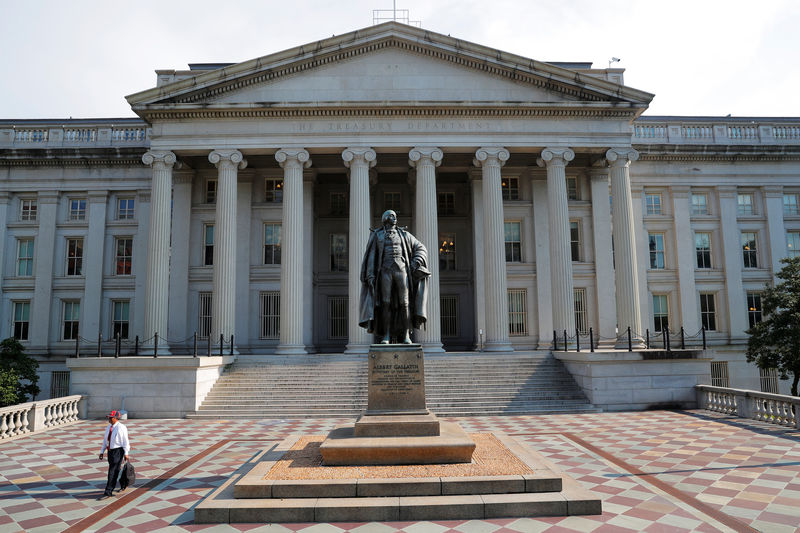By Richard Leong
NEW YORK (Reuters) - Some overseas investors appear to be taking a pass on U.S. debt securities just as the administration of President Donald Trump embarks on a record sale of Treasury bills, notes and bonds to pay for its big tax cuts and spending increases.
Top foreign holders of Treasuries like China and Japan have shrunk their portfolios of U.S. government bonds this year, and a recent barometer of participation in Treasury auctions suggests overseas buyers have not been showing up in force, according to Treasury Department data.
Some auctions since late October had the weakest foreign participation rates in nearly a decade, a Reuters analysis of U.S. Treasury sales shows. At the same time, auction sizes are rising fast, with bond issuance this quarter projected to set a record of $83 billion after deducting maturing debt.
"We do worry about where demand for Treasuries is going to come from, given the ongoing significant increase in supply," said Torsten Slok, chief international economist at Deutsche Bank (DE:DBKGn).
That concern will be on sovereign debt investors' minds this week with the Treasury scheduled to auction $129 billion in notes with maturities ranging from two to seven years beginning on Monday.
Foreign investors - both private funds and official entities such as central banks - have been lynchpin participants in the $15.3 trillion U.S. Treasury market for years. And while overall foreign holdings have remained steady at roughly $6.2 trillion, their participation has not grown materially in several years.
The Treasury market, meanwhile, has mushroomed in size, leaving foreigners to account for just 40.5 percent of the market as of September versus nearly 50 percent in January 2013.
A sustained slackening in foreign demand for Treasuries could hurt the U.S. economy. Lower demand means the government must increase the interest it pays out to attract buyers. Those higher federal borrowing costs not only add to the U.S. budget deficit, they also tend to push lending rates higher for consumers and corporations, which could knock the second-longest U.S. economic expansion off track.
GRAPHIC: Foreign net purchases of U.S. Treasuries - https://tmsnrt.rs/2Mys7DJ
CHINA, JAPAN SEEN PULLING BACK
China and Japan, the two biggest holders with more than $1 trillion each, have been scaling back their Treasuries portfolios for much of the year. The latest data showed their Treasuries ownership has dropped to their lowest since June 2017 and October 2011, respectively.
Analysts say the drop in Beijing's holdings stems in large part from spending foreign currency reserves to defend the weakening yuan amid signs of slowing domestic growth, although they do not rule out the possibility it might also be retaliation for Trump's barrage of tariffs on Chinese goods.
"Holdings have declined over the past four months and may continue to do so as the ongoing trade war sours the relationship between China and the U.S. and thus reduces their appetite for Treasuries," Jefferies LLC senior money market strategist Tom Simons wrote in a research note.
GRAPHIC: China, Japan Holdings of U.S. Treasuries - http://tmsnrt.rs/2DJ1ckW
In the case of Japan, the rising expense to hedge U.S. investments due to the strong dollar is seen as the main culprit.
GRAPHIC: China, Japan purchases of U.S. Treasuries - https://tmsnrt.rs/2J43Ggv
DIRECT BIDDING
More recently, a drop in so-called "direct bidder" participation at auctions has set off more alarms. Direct bidders are a select group of buyers allowed to place orders directly with the government rather than through Wall Street firms, a group that includes China.
"Direct bids have been exceptionally low," said John Canavan, market strategist at Stone & McCarthy Research Associates in New York. "There's been a collapse, absolutely."
Earlier this month, the Treasury awarded direct bidders just 3 percent of $37 billion in three-year note supply, this group's smallest share at an auction of this maturity in nine years.
Direct bidders bought an equally small share of a record-sized $19 billion, 30-year bond auction, and ended up with just 1 percent of the $27 billion of 10-year notes sold between the three-year and 10-year auctions. Direct bidding at the earlier auctions of two-, five- and seven-year notes in late October showed similar drops.
One explanation may be that buyers like China could be shifting back to indirect bidding through Wall Street banks.
At the most recent 10-year auction, indirect bidders won a record 73.83 percent share of the record 10-year supply, suggesting underlying investor demand for longer-dated U.S. debt is holding up for now as worries about global economic growth and steep drops in stock markets stoke demand for what are seen as the world's safest assets.
"Is it a reallocation in demand or a drop in overall demand?" Canavan asked.
GRAPHIC: Direct bidding at U.S. Treasury auctions - https://tmsnrt.rs/2PhIUAc
Institutional investors, particularly pension funds and insurance companies, will likely remain heavy buyers of long-dated Treasuries as a stable source of income to meet their payout obligations, analysts said.
Still, domestic buyers are not likely to absorb the Treasuries supply that foreigners refuse to purchase, analysts said.

"There is increased strain on dealers and domestic buyers to absorb the growing supply," said Gennadiy Goldberg, senior U.S rates strategist at TD Securities. "But someone has to buy the (additional) supply, and it's probably not foreign."